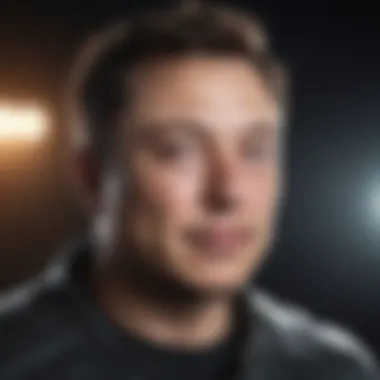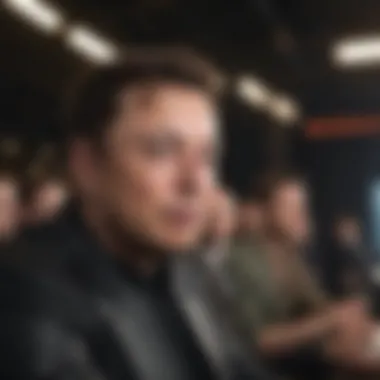Elon Musk: Insights into a Visionary Entrepreneur


Intro
In the realm of modern entrepreneurship, few figures shine as brightly as Elon Musk. Known for his ambitious ventures and relentless drive, Musk has fundamentally altered several industries ranging from automotive to space exploration. His unyielding quest for innovation has captivated the world, inspiring both admiration and skepticism. As we delve into Musk's mind, we uncover not just the successes but also the hurdles he has faced along the way. This exploration offers a glimpse into the mindset of a modern entrepreneur, revealing traits that resonate amidst the complexities of contemporary business.
Key Terms and Definitions
Understanding the landscape of entrepreneurship, especially in relation to figures like Musk, requires some clarity around key terms. Here are essential components that make up the terminology of this intriguing field:
- Disruption: The process by which a new innovation significantly alters or replaces an existing market or industry.
- Scalability: The ability of a business to grow and manage increased demand without compromising performance or revenue.
- Venture Capital: Financing that investors provide to startup companies and small businesses with perceived long-term growth potential.
These terms will help frame our understanding as we investigate Musk's entrepreneurial strategies and methodologies.
Investment Dictionaries
Investing in companies led by innovative figures like Musk takes well-rounded knowledge. This includes:
- Equity: Ownership interest in a company, often in the form of stock.
- IPO (Initial Public Offering): The process through which a private company offers shares to the public for the first time.
- Market Cap (Market Capitalization): The total value of a company's outstanding shares of stock.
Grasping these concepts will greatly enhance one's appreciation of the financial maneuvers at play in high-stake entrepreneurial ventures.
Terms Related to Stocks
For those looking to invest in Musk's ventures, certain stock market terms come into play:
- Bull Market: A market characterized by rising prices and widespread investor confidence.
- Bear Market: Ideally the opposite, showcasing a decline in prices and a lack of confidence.
- Dividend: A portion of a company's earnings distributed to its shareholders.
Understanding these terms can aid investors in making informed decisions related to Musk’s enterprises, such as Tesla and SpaceX.
Expert Advice
For budding investors aiming to maneuver the waters of entrepreneurship and innovation, consider the following:
Tips for Beginner Investors
- Start Small: Invest modest amounts while you learn.
- Research: Knowledge is power; thoroughly understand the companies you wish to invest in.
- Stay Informed: Keep up with the news surrounding the businesses of interest, especially in tech-heavy markets.
Understanding Risk Tolerance
Recognizing one's own tolerance for risk is vital:
- Evaluate how much loss you can handle.
- Consider your financial goals before jumping into the stocks of bold innovators like Musk.
- Consult financial advisors when in doubt to align your investments with your risk profile.
"Innovation distinguishes between a leader and a follower." – Steve Jobs
As this piece unfolds, we shall further dissect Musk's innovative ventures and how they mirror the intricacies of risk and strategy that embody the entrepreneurial spirit.
Prelims to Elon Musk's Entrepreneurial Journey
Elon Musk is often viewed as a linchpin in the modern entrepreneurial landscape. His various endeavors have brought transformative changes in multiple sectors, capturing the imagination of both seasoned investors and budding entrepreneurs. By examining Musk's journey, we can derive insights about what it takes to succeed in today’s business world.
Understanding Musk's early influences and initial ventures sets the stage for recognizing the implications of his innovative thinking and strategic risk-taking. This exploration goes beyond the surface, inviting readers to consider the complexities and nuances involved in shaping a successful entrepreneurial path. Examining Musk's methods sheds light on traits such as creativity and perseverance, which are essential for navigating the unpredictable waters of entrepreneurship.
Moreover, this section serves as a roadmap for analyzing his key milestones and ventures, allowing readers to contextualize Musk’s impact on modern business practices.


Background and Early Influences
Elon Musk was born in Pretoria, South Africa, and grew up in a household deeply infused with tech-savvy influences from a young age. His mother, Maye Musk, was a dietitian and model, while his father, Errol Musk, was an electromechanical engineer. Growing up in this environment stimulated his inquisitive mind. By the age of 12, Elon had already developed a video game called Blastar and sold it for about $500. This early foray into programming not only highlighted his aptitude for technology but also hinted at his entrepreneurial spirit.
Beyond family, Musk finds inspiration in books. He grew up reading a wide array, from sci-fi novels to works on philosophy and physics. Through these pages, he uhderstood broader visions of possibility, what humanity can achieve, and how technology can facilitate that journey.
In high school, Musk's family relocated to Canada, enabling him to attend Queen's University before he transferred to the University of Pennsylvania. His time in these academic settings fostered a mindset geared toward innovation and exploration, emboldening his ambitions and setting the groundwork for his future enterprises.
Initial Ventures and Key Milestones
Musk’s initial ventures were not without their trials, yet each experience contributed decisively to his eventual success. After completing his studies, he launched Zip2 in 1996, a company designed to help newspapers create an online presence. This was the nascent stage of the internet revolution, and Musk capitalized on it effectively. In 1999, Compaq purchased Zip2 for roughly $307 million, a windfall that Musk used to fund his next ventures.
Following that successful exit, he co-founded X.com in 1999, an early online payment platform. This venture eventually morphed into PayPal, which became an essential service in digital transactions. In 2002, eBay acquired PayPal for $1.5 billion in stock, and Musk netted a considerable share from this deal.
Through these initial endeavors, Musk built a robust foundation for future projects. Each milestone not only reflected monetary success but showcased an intrinsic drive to innovate and disrupt conventional industries.
"When something is important enough, you do it even if the odds are not in your favor." – Elon Musk
These first steps into the entrepreneurial realm were instrumental for Musk. They characterized the blend of intellect and risk that defines his career. Each venture comes with its share of lessons, with both failures and successes shaping his perspective on risk-taking and innovation. In summary, understanding these background elements provides critical context for analyzing Musk's future projects and their broader implications for industry and society.
Theoretical Foundations of Musk's Approach
Elon Musk’s entrepreneurial style is not just about diving into ventures but understanding the principles that drive his success. This section aims to unravel the theoretical foundations of Musk's approach, focusing on the two pivotal aspects: Vision and Strategic Risk-Taking and Innovative Disruption in Traditional Markets. These elements are crucial for grasping the essence of Musk’s methods, which combine foresight with an appetite for calculated risks. Understanding these foundations not only sheds light on his actions but also offers insights for aspiring entrepreneurs looking to carve their own paths in competitive landscapes.
Vision and Strategic Risk-Taking
Musk’s ventures often seem audacious, bordering on reckless, yet they are grounded in a strong visionary framework. His ability to foresee trends in technology and society equips him to undertake risks that most would shy away from. A notable instance is his push into electric vehicles with Tesla. While many doubted the viability of electric cars in the early 2000s, Musk saw potential where others saw failure.
An essential aspect of this vision is his conviction that technology must serve humanity's long-term survival. He articulates this in his commitment to sustainable energy and multiplanetary colonization. While his ideas may initially come off as far-fetched, historically, great breakthroughs often stem from thinking outside the box.
Musk exemplifies strategic risk-taking by:
- Analyzing Market Gaps: Rather than just improving existing technologies, he identifies gaps that others overlook, such as the potential for a mass-market electric vehicle, rather than just expensive luxury models.
- Long-term Planning: His projects often have a timeline that stretches far into the future, allowing him to invest in ideas that may not pay off immediately but promise significant returns down the line.
- Agility in Pivoting: When confronted with setbacks (for example, Tesla’s production issues), Musk adapts quickly, utilizing innovative solutions that maintain progress towards his long-term vision.
The essence of his approach can be captured in this > "In the face of uncertainty, a vision serves as a compass, guiding the course of bold endeavors."
Innovative Disruption in Traditional Markets
Musk’s hallmark is his ability to disrupt established industries by introducing radical innovations that challenge conventional norms. This isn’t merely about being different; it’s about rethinking the entire paradigm. For instance, with SpaceX, he didn’t just aim to launch satellites; he set out to make space travel affordable and accessible. The traditional aerospace industry was dominated by a handful of companies with bloated budgets and antiquated practices. In stark contrast, SpaceX focuses on streamlining manufacturing processes and cutting costs.
His approach towards disruption includes:
- Driving Down Costs: By developing reusable rockets, SpaceX not only cuts costs significantly but alters the entire economic model of space travel.
- Challenging the Status Quo: Musk’s ventures encourage community play and involvement, making it more than just a business but a movement.
- Leveraging Technology: Tesla's continuous software updates allow for improvements and new features, extending the lifespan and functionality of their vehicles, a stark deviation from traditional automotive practices.
Musk's strategy in this area has fundamentally shifted how industries operate, making it increasingly difficult for competitors to hold onto outdated methodologies. He embodies the belief that with the right tools and mindset, one can upend even the most entrenched businesses.
Key Ventures and Their Impact
Elon Musk's ventures have not only transformed the industries he entered but have also reshaped the entrepreneurial landscape itself. His ability to identify pressing global challenges and create innovative solutions illustrates the power of modern entrepreneurship. The discussion of Musk's key ventures, namely PayPal, Tesla, SpaceX, The Boring Company, and Neuralink, allows us to unpack not just the success stories but also the lessons learned from challenges faced along the way. By examining these ventures, we see how Musk's ideas and execution have had a monumental impact on technology, consumer behavior, and the economy, ultimately paving the way for a more sustainable and advanced future.
PayPal: The Digital Revolution
PayPal emerged as a groundbreaking venture that reshaped the way people conduct online transactions. Launched as a digital wallet, it eliminated the need for physical currency, thereby making online purchases seamless and secure. The appeal of PayPal was its ease of use; users could send and receive money with just a few clicks, which was a godsend during the early days of e-commerce. The company gained traction quickly, and its successful model laid the groundwork for many online payment systems that followed.


Tesla: Reinventing Transportation
Tesla stands out as perhaps Musk's most famous venture, with far-reaching implications for the automotive industry and beyond. It represents a complete overhaul of traditional transportation methodologies, focusing on electric vehicles and sustainable energy.
Disruptive Technology
Disruptive technology is at the heart of Tesla's mission. This approach involves introducing innovations that challenge the status quo, replacing gasoline-powered engines with electric ones. The key characteristic of Tesla’s technology is not just the vehicles themselves but the entire ecosystem surrounding them, including charging stations and autonomous driving features. This disruptive innovation has proven beneficial by promoting renewable energy and reducing reliance on fossil fuels, which is a significant shift for a century-old industry.
Sustainable Energy Solutions
Sustainable energy solutions are another crucial aspect of Tesla. The company doesn't merely sell cars; it actively promotes energy production and storage. Products like the Powerwall and solar panels support a vision for a self-sufficient energy economy. This unique feature addresses energy challenges faced by consumers and businesses alike, offering clean, renewable energy options. However, the challenges include high initial costs and a still-developing infrastructure that can create hesitance among potential customers.
Market Positioning and Challenges
Tesla's market positioning is as ambitious as its goals. By presenting itself as a luxury brand amidst a wave of traditional automakers, it has carved out a niche that appeals to environmentally conscious consumers willing to invest more. However, the challenges of scaling production while maintaining quality and navigating tight competition from established brands are ongoing. The company's ability to adapt to market fluctuations will be vital to its sustained success.
SpaceX: Commercializing Space Travel
Another milestone in Musk's career, SpaceX, aims to revolutionize space transportation. It has carved a path toward commercial space travel that was previously thought to be the domain of government agencies.
Technological Innovations
Technological innovations are fundamental to SpaceX's mission to make space travel more resource-efficient and sustainable. The development of reusable rockets like the Falcon 9 signifies a pivotal breakthrough. This characteristic makes space endeavors more economically viable, offering a potential reduction in costs. The unique feature of this approach has wider implications, potentially leading to more frequent missions and deeper exploration of space.
Public versus Private Space Exploration
With SpaceX pushing boundaries, the conversation around public versus private space exploration has gained traction. This dynamic brings both competition and collaboration into play. SpaceX’s ability to work alongside agencies like NASA showcases a unique synergy that can propel space exploration forward. Yet, there are ethical and regulatory concerns that come into play when private firms dominate such a critical area, underscoring the need for careful oversight to prevent monopolistic behaviors.
Future Prospects
The future prospects for SpaceX are exciting yet uncertain. Musk's ambition to reach Mars and beyond presents a series of challenges, from technological developmental hurdles to funding issues. However, the space sector's growing interest and investment hint at a renaissance in space exploration, one that could redefine humanity's relationship with the cosmos.
The Boring Company: Infrastructure Evolution
The Boring Company represents Musk's innovative approach to infrastructure challenges. By focusing on improving urban transportation through tunneling, this venture aims to alleviate the congestion often seen in cities. The methods employed are both unconventional and groundbreaking, suggesting a shift in how urban planners might address transportation issues in the future.
Neuralink: Bridging Human-Technology Interface
Lastly, Neuralink explores the intersections of technology and biology. By working to connect human brains with machines, the company delves into uncharted territory, promising potential breakthroughs in treating neurological diseases and enhancing human cognitive function. However, the ethical implications surrounding such advancements pose serious considerations for Musk and his team. The balancing act between innovation and ethics will shape the trajectory of this venture and its acceptance in society.
Challenges and Controversies
Navigating the turbulent waters of entrepreneurship often entails facing significant challenges and controversies. For Elon Musk, the path has been anything but smooth. These challenges not only test the mettle of an entrepreneur but also often define their legacy. In Musk's case, his ventures have consistently sparked both widespread admiration and fierce criticism. Analyzing the challenges he encounters gives a nuanced understanding of the pressures inherent in high-stakes innovation and the complexities of modern leadership.
Public Relations and Communication Style
One of Musk's most distinctive characteristics is his unique approach to public relations. His communication style, particularly through social media, has been a double-edged sword. While it allows him to engage directly with fans and investors, it also opens the door for misunderstandings and controversies. He's been known to casually tweet about crucial business aspects, often leading to significant market fluctuations. In fact, on several occasions, his tweets have prompted regulatory scrutiny, demonstrating how his informal communication style can backfire.
Furthermore, Musk’s candid expressions sometimes border on recklessness. This has led to a series of legal challenges, as regulators step in to ensure he doesn’t mislead investors. His communication style raises pertinent questions regarding accountability in the tech industry and the expectations of leadership in a highly interconnected world. Ultimately, it reflects a broader trend where the lines between personal and professional conduct become increasingly blurred.
Ethical Implications of Innovation


Innovation is the lifeblood of Musk's ventures, yet it carries ethical implications that cannot be overlooked. At the core of his companies, be it Tesla's autonomous driving capabilities or SpaceX's ambitious plans for interplanetary travel, lies the question of responsibility.
The rapid pace of his innovations poses ethical dilemmas regarding safety, data privacy, and the potential environmental impacts of new technologies. For example, Tesla's approach to data collection from its vehicles raises concerns about user privacy and consent. Is it ethical to gather vast amounts of data without explicit awareness from car owners?
Moreover, in the race to dominate the electric vehicle market, questions about sustainable sourcing for raw materials often come to light. Are the resources used for batteries ecologically sustainable? The less-than-transparent nature of supply chains has ethical ramifications that stretch far beyond business performance. The balancing act between breakthrough advancements and ethical responsibilities continues to challenge Musk's enterprises.
Financial Risks and Volatility
Ventures spearheaded by Musk epitomize a high-risk, high-reward landscape, reflecting the volatile nature of the modern investment climate. The financial strategies employed by his companies often attract a mixed bag of investors—some drawn by the potential for astronomical returns, and others wary of the inherent risks involved.
One stark example is Tesla’s fluctuating stock prices, which can swing wildly based on Musk's influence and public sentiment. The company has seen a meteoric rise to become one of the most valuable retailers in the world, yet its stock volatility also underscores a persistent reality: that optimism often outpaces actual performance metrics.
This kind of financial environment poses considerable risks not just for Musk himself, but also for individual investors. The unpredictable nature of markets influenced by charismatic leaders raises the stakes significantly. Investing in Musk's projects requires not just capital but a strong stomach to weather the inevitable ups and downs.
Musk's Influence on Modern Entrepreneurship
In the landscape of contemporary business, Elon Musk stands out as a catalyst for change. His influence on modern entrepreneurship has been profound, reaching beyond just the companies he founded. It trickles down to philosophies about innovation, risk management, and how to approach the future of industries. Musk’s tactical vision and boundary-pushing mindset have not only redefined sectors but also set new benchmarks for what it means to be an entrepreneur today.
One of the key elements of Musk's contemporary entrepreneurial impact lies in his relentless pursuit of ambitious goals. The audacity to think big has become a hallmark of his character, encouraging others—both investors and aspiring business owners—to take similar leaps of faith. This shift represents a significant playbook for those looking to make a mark in a fast-evolving technological world. The charismatic yet often controversial persona combines with groundbreaking ideas, leading to a unique synergy that draws both admiration and skepticism.
Shaping Investor Expectations
Musk’s approach has undeniably shaped investor expectations. When it comes to funding new projects, investors now often seek out ventures that challenge the status quo. The willingness to provide capital for companies with bold missions, like SpaceX or Tesla, reflects a tectonic shift in how potential risks and rewards are viewed. Likewise, investors are now more inclined to support ventures that focus on long-term goals rather than short-term gains, influenced heavily by Musk's narratives of necessity for change in areas such as sustainable energy and space exploration.
Moreover, his ventures tend to attract a specific type of investor interested in not just financial returns, but also in their contribution to societal progress. This blend of capital and purpose is reshaping market dynamics, pushing startups to align their goals with broader societal needs. For instance, the booming interest in electric vehicles wasn’t just signaled by Tesla’s sales numbers; it started from Musk's broader vision articulated through various public forums.
"Investors are not merely looking at numbers anymore; they are drawn to the narrative, the vision. Musk has set a precedent for having a story that is worth investing in."
Encouraging Youth Entrepreneurship
Elon Musk's influence extends to encouraging youth entrepreneurship, inspiring a new generation of innovative thinkers. His public persona and ventures serve as a blueprint for young entrepreneurs, proving that unconventional ideas can indeed lead to monumental changes in society. By sharing his own journey, Musk moves the needle, prompting younger individuals to explore their ideas with an open mind and a willingness to fail.
Through platforms like Twitter, he engages with a younger audience that often finds inspiration from his unconventional path. It encourages them to pursue their entrepreneurial dreams, undeterred by setbacks. Educational initiatives such as the Musk Foundation, which supports science and engineering education, further underscore his commitment to nurturing emerging talent.
- Specific items to note about Musk’s impact on youth include:
- The encouragement to think outside the box.
- A tangible demonstration that hard work and perseverance can yield surprising results.
- A reminder that risk is sometimes a necessary ally in the quest for innovation.
End: The Legacy of Elon Musk
Elon Musk stands as a towering figure in the realm of contemporary entrepreneurship. His legacy weaves together innovation, risk-taking, and a relentless pursuit of change. The conclusion of this article aims to distill Musk’s impactful journey into key insights while exploring his future directions and enduring influence.
Reflecting on Achievements and Future Directions
Musk’s achievements are nothing short of monumental. With each venture—from PayPal’s digital finance revolution to Tesla’s electric automobiles—he has reshaped paradigms across industries.
- Transformational Business Models:
Musk leveraged traditional industries and brought them into the modern era. His strategies often include vertical integration and optimizing production processes—tactics that drive efficiency and lower costs. For example, Tesla's direct-to-consumer sales model subverts age-old dealership practices in the automotive sector. - Technological Innovation:
Musk’s ventures are heavily rooted in technological advances. SpaceX's reusable rocket technology is a game-changer, enabling more affordable space travel. This innovation not only enhances commercial prospects but also reignites public interest in space exploration. - Vision for Sustainability:
Musk has a clear direction towards sustainable energy. The SolarCity and Tesla battery initiatives show his commitment to a future where sustainable solutions are integrated into daily life. This not only appeals to environmentally-conscious consumers but is pivotal in the broader context of climate change mitigation.
As we look ahead, Musk’s influence seems poised to grow. The direction he steers toward includes not just technological advancement but also societal impact. The electric vehicle movement isn’t merely about car sales; it’s about establishing new norms for urban transport and energy consumption.
Final Thoughts on Entrepreneurial Impact
Musk's mark on entrepreneurship is profound. It’s not simply about the companies he’s built but how he’s changed the way we think about business.
- Refreshing Investor Relations:
Musk's approach to funding—from initial public offerings to SpaceX's private investments—shakes traditional investment frameworks. He engages audiences with a straightforward style. His candid nature on social media provides a refreshing transparency rarely seen in high-stakes business dealings. - Inspiring a New Generation:
The audacity of Musk's visions inspires young entrepreneurs to push boundaries. His story resonates especially among those in tech and engineering fields. Startups today often look toward his journey as a blueprint, encouraging risk-taking and innovative thinking. - Cultural Influence:
Musk's ventures breach the traditional confines of business. With a legacy entwined with pop culture—evident through Twitter, memes, and collaborative projects—he embodies the modern entrepreneur who must also navigate public perception.
"Musk's approach encapsulates the essence of risk in entrepreneurship: the greater the ambition, the larger the reward."
In a world where disruption is the new norm, Musk’s legacy will be a constant reminder of the art of melding vision with action. Whether through his successes, failures, or audacious plans for humanity, his impact on entrepreneurial landscapes is undeniable. As aspiring entrepreneurs scrutinize his path, they do so with the understanding that the future is built on the foundation of daring decisions and ceaseless innovation.















